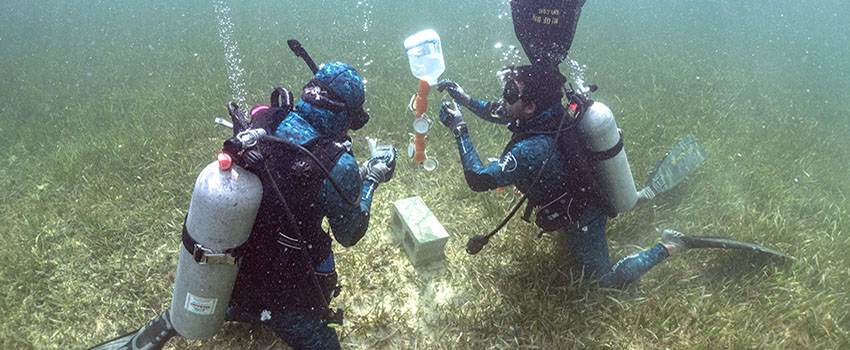Master of Science in Marine Sciences

Make Waves in Marine Research
The Master of Science in Marine Sciences program offers comprehensive and interdisciplinary training. Our program combines advanced coursework, experiential learning, and expert mentorship to empower exemplary students with both applied and theoretical knowledge, preparing them for careers in marine science.
Why Choose Our M.S. in Marine Sciences Program?
Local & Global Research Opportunities
The program is structured to allow students to develop the capacity for productive and innovative research, founded on a solid background of broad scientific knowledge. From Alabama to Antarctica, our marine science research program spans the globe.
Coastal Access
The program is administered from the main campus in Mobile, but some students and faculty are in residence at the Dauphin Island Sea Lab located 35 miles to our south.
Within a short distance of these locations are diverse habitats including:
Mobile Delta
Mobile Bay
Mississippi Sound
Barrier Islands
Open Gulf Habitats
Expert Mentorship
Our world-renowned faculty is committed to:
training the next generation of marine scientist
pursuing excellence in research
assisting in sustainable management of marine resources
Requirements for Master of Science in Marine Sciences
Students are normally admitted in the Fall Semester. Although applications for admissions and fellowships are accepted throughout the year, application before February 1st is encouraged. The Admissions committee will make initial recommendations about applicants for the following fall class beginning February 15th of each year.
For the most accurate and official program requirements, please consult the Graduate Bulletin. Website information is for general reference only and may not reflect recent updates.
In addition to the general admissions requirements of the Graduate School, requirements for admission to the Marine Sciences M.S. program are:
1. A narrative statement indicating the student's
- research interests
- professional goals
- and commitment to full-time study for completion of degree requirements.
It is highly encouraged that prospective students reach out to the faculty to discuss research interests.
All of our M.S. students are funded on grant-funded research assistantships. Thus, acceptance of new students may be a condition of available funding.
2. Three letters of recommendation.
For students with baccalaureate degrees:
a. A baccalaureate degree in a discipline related to marine sciences (e.g., biology,
chemistry, geology, physics) from an accredited four-year college or university.
b. Applicants to graduate programs in Arts and Sciences typically have a minimum GPA of at least a 3.0 on all undergraduate work. In exceptional cases, applicants may be considered with at least a 2.5 GPA on all undergraduate work, or at least a 2.75 GPA on the last 60 hours of undergraduate work.
c. The GRE score is not required for admission. You may optionally submit your GRE scores if you wish for them to be considered as part of your application to any graduate program in the Stokes School of Marine and Environmental Sciences, but this is not required. Individual faculty members may consider available GRE scores as part of a holistic evaluation of the candidates.
International students refer to International Admissions and Student Programs
A maximum of twelve (12) semester hours of graduate courses taken at another accredited university in the same (or closely related) subject as that of the masters program may be considered as part of the MS degree requirements at USA.
Only grades of "A" or "B" or "S" may be accepted as transfer credits.
The student's mentor (major professor), in consultation with the Associate Director, and if necessary, the student's advisory committee, will evaluate transfer credit.
The final approval is by the Dean of the Graduate School.
A minimum of two (2) consecutive semesters of full-time study in residence is required. The residency requirements may be met at USA or the Dauphin Island Sea Lab.
Students are considered full-time if registered for six (6) or more hours during fall and spring semesters.
Students on assistantship must be registered continuously, i.e., every semester (fall, spring, and summer), during their program.
Employment other than University activities directly associated with graduate study is not allowed during full-time study, unless specifically approved by the Director.
All requirements for the M.S. degree must be completed within three (3) years from the date of matriculation
A student who has not satisfactorily completed a M.S. degree in a three-year period must apply for a defined extension to complete the degree.
This request must be recommended by
- a major professor
- the Director or Associate Director
- the Director of Graduate Studies
- and approved by the Dean of the Graduate School
Failure to complete the work within the periods specified shall necessitate reevaluation of the student's program, and may result in a recommendation of dismissal by the Director of Graduate Studies to the Graduate Dean.
A minimum of thirty (30) semester hours of approved graduate credit is required consisting of:
- Two Core Courses totaling eight (8) credit hours. Must make "B" or higher in these courses
- Two Enrollments in Seminar, one each semester, totaling two (2) credit hours.
- Directed Studies: maximum of six (6) credit hours
- Thesis: maximum of six to nine (6-9) credit hours
- Select Marine Sciences or other electives (500 or 600 level courses) as determined by advisory committee
Completion of two (2) core courses, representing eight (8) credit hours with a "B" or above is required.
| Required (Choose two ) | ||
|---|---|---|
| Course Code | Course Name | Credit Hours |
| MAS 601 | Physical Oceanography | 4 |
| MAS 602 | Chemical Oceanography | 4 |
| MAS 603 | Geological Oceanography | 4 |
| MAS 604 | Biological Oceanography | 4 |






